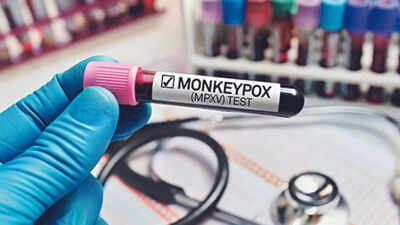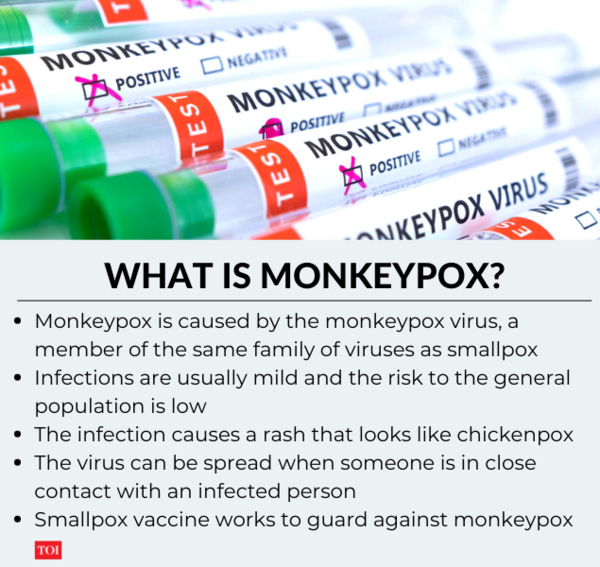Top Searches
- News
- India News
- Kerala reports India's second Monkeypox case; Centre advises screening international passengers
Kerala reports India's second Monkeypox case; Centre advises screening international passengers

NEW DELHI: The Centre on Monday advised officials to strictly screen all international arrivals at ports and airports, hours after Kerala reported India's second Monkeypox case.
Amid rising concern of an outbreak, the ministry of health & family welfare said that the Centre has reviewed health inspection procedure at the Points of Entry at international airports and ports.

"State, airport and port health officers have been advised to ensure health screening of all international travellers to minimise the risk of importation of Monkeypox disease," the ministry said.
Second case in Kerala
Kerala on Monday reported the second infection, just five days after it detected the first one.
Health minister Veena George said "the second positive case has been confirmed in Kannur district".
Officials said that a 31-year-old Kannur native was infected and is under treatment at Pariyaram medical college. He had returned from Dubai on July 13.
His samples were sent to NIV Pune and they tested positive for monkeypox, the officials said. "The patient's health condition is reported to be satisfactory. Those in close contact with him have been put under surveillance," said George.
The first case of Monkeypox was confirmed from Kerala on July 13. A 35-year-old man who came from UAE a few days ago has been admitted to Thiruvananthapuram medical college. While in UAE, the patient was in close contact with a person who tested positive for the disease.
The Union Health Ministry had rushed a high-level multi-disciplinary team to Kerala to assist the state health authorities in instituting public health measures.
Those who suspect symptoms should seek immediate medical help. Fever, headache, rashes and blisters on the face, inside mouth and other parts of the body are the major symptoms. Since the disease spreads through body fluids, the patients and suspects are supposed to cover their body fully to avoid spreading of the disease.
What is Monkeypox?
Monkeypox is a virus that originates in wild animals like rodents and primates, and occasionally jumps to people. Most human cases have been in central and west Africa, where the disease is endemic.
The illness was first identified by scientists in 1958 when there were two outbreaks of a “pox-like” disease in research monkeys — thus the name monkeypox. The first known human infection was in 1970, in a 9-year-old boy in a remote part of Congo.
What are the symptoms and how is is treated?
Monkeypox belongs to the same virus family as smallpox but causes milder symptoms.
Most patients only experience fever, body aches, chills and fatigue. People with more serious illness may develop a rash and lesions on the face and hands that can spread to other parts of the body.
The incubation period is from about five days to three weeks. Most people recover within about two to four weeks without needing to be hospitalized.
Monkeypox can be fatal for up to one in 10 people and is thought to be more severe in children.
People exposed to the virus are often given one of several smallpox vaccines, which have been shown to be effective against monkeypox. Anti-viral drugs are also being developed.
(With inputs from agencies)Watch Monkeypox: Kerala reports India's second case
Amid rising concern of an outbreak, the ministry of health & family welfare said that the Centre has reviewed health inspection procedure at the Points of Entry at international airports and ports.

"State, airport and port health officers have been advised to ensure health screening of all international travellers to minimise the risk of importation of Monkeypox disease," the ministry said.
Second case in Kerala
Kerala on Monday reported the second infection, just five days after it detected the first one.
Health minister Veena George said "the second positive case has been confirmed in Kannur district".
Officials said that a 31-year-old Kannur native was infected and is under treatment at Pariyaram medical college. He had returned from Dubai on July 13.
His samples were sent to NIV Pune and they tested positive for monkeypox, the officials said. "The patient's health condition is reported to be satisfactory. Those in close contact with him have been put under surveillance," said George.
The first case of Monkeypox was confirmed from Kerala on July 13. A 35-year-old man who came from UAE a few days ago has been admitted to Thiruvananthapuram medical college. While in UAE, the patient was in close contact with a person who tested positive for the disease.
The Union Health Ministry had rushed a high-level multi-disciplinary team to Kerala to assist the state health authorities in instituting public health measures.
Those who suspect symptoms should seek immediate medical help. Fever, headache, rashes and blisters on the face, inside mouth and other parts of the body are the major symptoms. Since the disease spreads through body fluids, the patients and suspects are supposed to cover their body fully to avoid spreading of the disease.
What is Monkeypox?
Monkeypox is a virus that originates in wild animals like rodents and primates, and occasionally jumps to people. Most human cases have been in central and west Africa, where the disease is endemic.
The illness was first identified by scientists in 1958 when there were two outbreaks of a “pox-like” disease in research monkeys — thus the name monkeypox. The first known human infection was in 1970, in a 9-year-old boy in a remote part of Congo.
What are the symptoms and how is is treated?
Monkeypox belongs to the same virus family as smallpox but causes milder symptoms.
Most patients only experience fever, body aches, chills and fatigue. People with more serious illness may develop a rash and lesions on the face and hands that can spread to other parts of the body.
The incubation period is from about five days to three weeks. Most people recover within about two to four weeks without needing to be hospitalized.
Monkeypox can be fatal for up to one in 10 people and is thought to be more severe in children.
People exposed to the virus are often given one of several smallpox vaccines, which have been shown to be effective against monkeypox. Anti-viral drugs are also being developed.
(With inputs from agencies)Watch Monkeypox: Kerala reports India's second case
FOLLOW US ON SOCIAL MEDIA
FacebookTwitterInstagramKOO APPYOUTUBE
Start a Conversation
end of article










